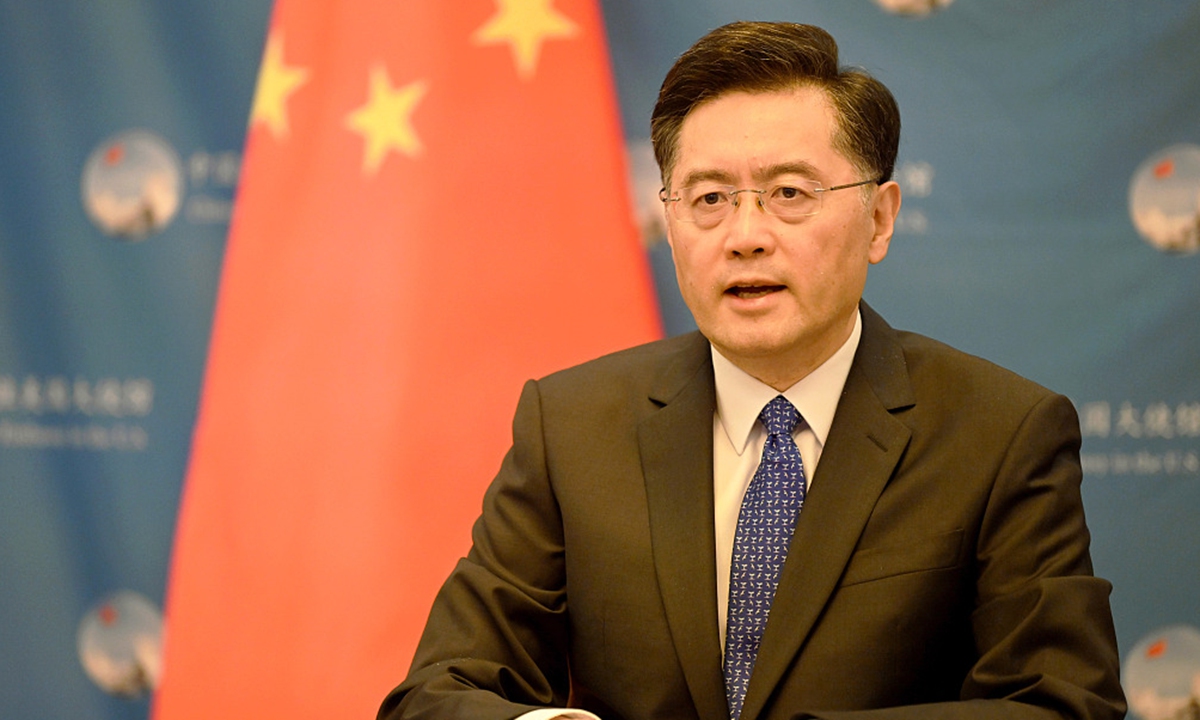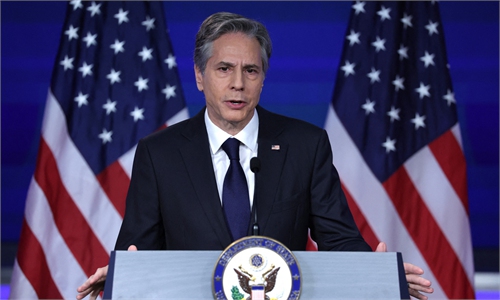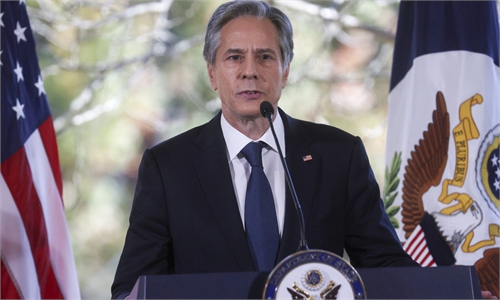Chinese ambassador warns ‘malicious confrontation’ after US announces ‘invest, align, compete’ strategy, analysts says decoupling attempt to fail
US ‘invest, align, compete’ strategy doomed to fail: analysts

Chinese Ambassador to the US Qin Gang Photo:VCG
The US' threefold strategy of "invest, align, compete" to tackle the so-called long-term China challenge, an economic coercion devised by Washington to contain the development of the world's second-largest economy based upon its hegemonic mindset, is doomed to fail as the approach is contradictory in substance and countries won't buy into its decoupling attempt to set up a China-free supply chain, Chinese observers and officials said.
The complex and intertwined bilateral trade and economic ties between the world's two largest economies are also on vivid display at a narrative given by Chinese Ambassador to the US Qin Gang at a forum, during which the Chinese diplomat highlighted how US tariffs on Chinese goods bite US business while warning that "malicious confrontation" would lead to dangerous consequences.
Qin's comment was made at a global economic summit in Indiana on Thursday (US time), shortly after Secretary of State Antony Blinken delivered a China policy speech. Blinken explained the threefold strategy as "investing at home, aligning efforts allies and partners and competing with China."
"The China strategy Blinken proposed is contradictory, but the paradox is also in line with the Biden administration's policy toward China - the willingness to cooperate but launch a confrontation and threatening policy," Song Guoyou, deputy director of the Center for American Studies, Fudan University told the Global Times on Friday.
Song noted that the ambiguity was rooted in a problematic US domestic economy, since competition between China and the US comes to a stage of "competition of comprehensive national strength."
"But the US is lacking confidence facing the competition, thus it turns to wielding sanctions," Song said. Analysts noted that the sluggishness in the US economy is partly fueled by mounting in-flation, which US tariffs on Chinese im-ports exacerbate. It further shows the indispensable role China plays in the US economy.
Qin said that the US government is evaluating whether to extend the first batch of tariffs imposed on Chinese products, which is due on July 5, which "everybody here" is looking for good news. But China "will fight to the end" if US extends the tariffs, he stressed.
While Song noted unlike political ties, trade between the two is multi-dimensional, given the surging trade even amid already high-level tariffs. It means that there is still some "healthy competition and cooperation" in the trade sector.
As the world's two largest economies and each other's most important trading partner, China and the US are deeply integrated economically. In 2021, China-US trade reached a record high of more than $750 billion, a surge of 28.7 percent on a yearly basis.
Among them, China imported products worth $179.5 billion, a year-on-year in-crease of 32.7 percent. China-US economic and trade relations support 2.6 million US jobs, according to Qin.
With regard to the align dimension, ana-lysts said the US-aligned approach to set up small circles to exclude China from the global supply chain would be in vain. Such decoupling is quite destructive to bilateral trade ties, but both sides know that a total industrial chain cutoff is impossible, Song said.
Qin said that China is an important trading partner of Indiana and its third largest export market, creating abundant job opportunities to locals. China is also the biggest export market of US agricultural products.
Chinese market, with over 400 million middle-income people that is still growing, also attracts American businesses. Qin also encourages more Indiana enterprises to seize opportunities on the future development of key sectors in China, such as agricultural, medicine, auto and engines, which the US state also has an edge.
Blinken's speech echoes one of the main focuses of Biden's Asia trip—to promote the Indo-Pacific Economic Framework (IPEF), which some described as the economic version of NATO and an important tool for the US to conduct geo-economic competition against China.
Examples of US-led "small circles" also include NATO and AUKUS, which are also enclosed, as well as the Trans-Pacific Partnership which Washington had pulled out, rendering less incentives for countries to participate and echo with its call.
"The US in the near future will mobilize more resources to target China, but will countries buy into it? The response from ASEAN may also offer a clue," Huo Jianguo, vice chairman of the China Society for World Trade Organization Studies in Beijing, told the Global Times on Friday.
Commenting on the claimed competition by the US, Qin said that such competition is not a fair and healthy one, but a "malicious confrontation" that either forces others to accept its self-made rules or even contains and curb the other "by hook or by crook."
He added that using competition to define bilateral relations would only escalate tensions and trigger confrontation. The fundamentals of bilateral relations should be cooperation and win-win. Even if there is competition, it should not be the main-stream of China-US relations, Qin said.
Although it remains to be seen how detailed policies come out, analysts stressed that China is only willing to accept competition that has a "bottom line."
Chinese Foreign Ministry spokesper-son Wang Wenbin said on Friday that China firmly opposes Blinken's speech on its China policy, which spreads false information, hypes China's threat and interferes in our internal affairs, aiming to suppress China's development and safeguard US hegemony.


